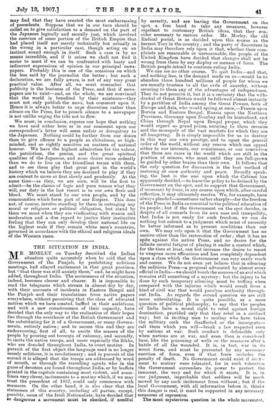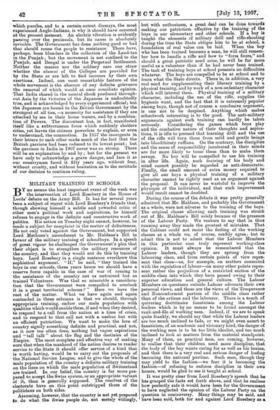THE SITUATION IN INDIA.
MR. MORLEY on Tuesday described the Indian situation quite accurately when he said that the Government of the Punjab, by prohibiting seditious meetings, had allayed excitement in that great province, but "that there was still anxiety there," and, he might have added, throughout India. The seriousness of the situation, indeed, becomes clearer and clearer. It is impossible to read the telegrams which stream in almost day by day, with their accounts of incidents in Eastern Bengal and the Punjab and their translations from native papers everywhere, without perceiving that the class of educated natives which we have created, baffled in their ambitions, and with a new consciousness of their capacity, have decided that the only way to the realisation of their hopes lies through the overthrow of the British Government and the substituting for it of a Government, or many Govern- ments, entirely native ; and to secure this end they are endeavouring, first of all, to excite the masses of the people by pouring out torrents of calumny, and secondly, to incite the native troops, and more especially the Sikhs, who are dreaded throughout India, to overt mutiny. In pursuit of the first object the language used is no longer merely seditious, it is revolutionary ; and in pursuit of the second it is alleged that the troops are addressed by word of mouth, or through the travelling agents who in the guise of devotees are found throughout India, or by leaflets printed in the capitals containing most violent, and some- times very clever, incitements to a mutiny which, if we may trust the precedent of 1857, could only commence with massacre. On the other hand, it is also clear that the statesmen of this country, including all parties, except, possibly, some of the Irish Nationalists, have decided that 80 dangerous a movement must be checked, if needful by severity, and are leaving the Government on the spot a free hand to take any measures, however repellent to customary British ideas, that they con- sider necessary to restore order. Mr. Morley, the old Radical purist, is as decided upon this course as the fiercest Tory in the country ; and the party of discontent in India may therefore rely upon it that, whether their com- plaints are reasonable or unreasonable, the people of the United Kingdom have decided that changes shall not be wrung from them by any display or menace of force. The British people intend to continue ruling India.
We can see no other course. To quit India---and that, and nothing less, is the demand made on us—would be to abandon three hundred millions of people for whom we are morally trustees to all the evils of anarchy, without securing to them any of the advantages of independence. They do not perceive it, but it is a certainty that the with- drawal of Great Britain would be followed almost instantly by a partition of India among the Great Powers, both of Europe and Asia, who would spring at once,—France upon Burma and Eastern Bengal, Russia upon the Northern Provinces, Germany upon Bombay and its hinterland, and China through Nepal upon Bengal proper, which they would regard as grand prizes, securing to them revenue and the monopoly of the vast markets for which they are all hungering. It is simply impossible for us to destroy in this way our own prestige, and to upset the general order of the world, without any reason which can appeal either to our interests, our consciences, or our conviction that there are races in the world which are still in the position of minors, who must until they are full-grown be guided by other brains than their own. It follows that the only question for discussion is the best method of restoring at once authority and peace. Broadly speak- ing, the best is the one upon which the Cabinet has apparently decided,—to leave the policy to be devised by the Government on the spot, and to support that Government, if necessary by force, in any course upon which, after careful reflection, it may ultimately resolve. We, for example, have always pleaded—sometimes rather sharply—for the freedom of the Press in India as essential to the political education of its people ; but if the Government on the spot decides, in despite of all counsels from its own ease and tranquillity, that India is not ready for such freedom, we can do nothing but submit to a judgment which must of necessity be better informed as to present conditions than our own. We may rely upon it that the Government has no motive other than the restoration of order ; that it has no spite against the native Press, and no desire for the infinite mental fatigue of placing it under a control which, for the time at least, can but increase the desire to resort to weapons more efficacious and less completely dependent upon a class which the Government can very easily reach and coerce. We do not even yet believe that in silencing the seditious Press—a proposal advocated by almost every official in India—we should touch the sources of an evil which remains still something of a mystery ; but the injury to be done by such temporary silencing must be trifling when compared with the injuries which would result from a kind of civil war that would paralyse authority through- out India. As regards the second question we are still more unhesitating. It is quite possible, as a mere question of political philosophy, to say that the peoples of India have a moral right to rebel against foreign domination, provided only that they rebel in a civilised. way ; but in inciting men to mutiny who have taken the military oath the disaffected or the insurgents— call them which you will—break a law respected even by nations at war. Such conduct is defensible only when nations are at war, and even then is considered base, like the poisoning of wells or the massacre after a battle of all the wounded. It is, in fact, war in its worst form, and must be prevented by any necessary exertion of force, even if that force includes the penalty of death. No Government could exist if inc;t ment to mutiny were tolerated, for in such toleration the Government surrenders its power to protect the innocent, the very end for which it exists. It is, in our judgment, improbable that soldiers will be much moved by any such incitement from without ; but if the local Government, with all information before it, thinks this danger is real, it must be supported in any necessary measures of repression. The most mysterious question in the whole movement, Which puzzles, and to a certain extent dismays, the most experienced Anglo-Indians, is why it should have occurred at the present moment. An electrie vibration is evidently passing over the peninsula, but its cause is absolutely invisible. The Government has done nothing good or bad that should rouse the people to resistance. There have, perhaps, been blunders in the collection of the Land-tax in the Punjab ; but the movement is not confined to the Punjab, and Bengal is under the Perpetual Settlement. Neither the masses nor the soldiery care one straw whether the alumni of the Colleges are provided for by the State or are left to find incomes by their own exertions. Indeed, one most remarkable feature of the whole movement is the absence of any definite grievance the removal of which would at once conciliate opinion. That India shared in the mental shock produced through. out Asia by the victories of the Japanese is undoubtedly true, and is acknowledged by every experienced official; but the Japanese are bound to the British. Government by the strongest of all ties, —a necessity for assistance if they are attacked by sea in their home waters, and by a combina- tion of Powers. The discontent has, in fact, manifested itself like a subterranean force which suddenly shatters cities, yet leaves the citizens powerless to explain, or even to understand, the commotion. In 1857 the insurgents in their letters to each other made much of the fact that the British garrison had been reduced to its lowest point; but the garrison in India in 1907 never was so strong. There will be an explanation by and by; but for the present we have only to acknowledge a grave danger, and face it as our countrymen faced it fifty years ago, without fear, without cruelty, and without hesitation as to the rectitude of our decision to continue ruling.







































 Previous page
Previous page